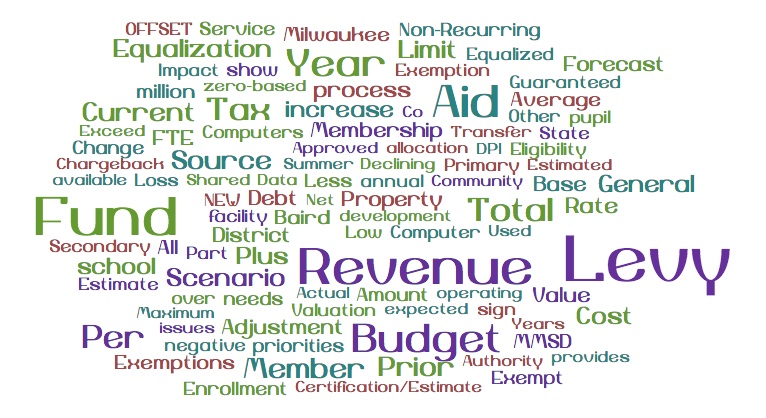
Madison School District (PDF):
This budget forecast and those that will follow are intended to keep the board informed as the budget development process unfolds. The forecasts also provide an opportunity for board discussion and input into important budget development issues.
MMSD’s Strategic Framework establishes the direction of the school district. The framework is supported by the annual budget, which is simply the resource strategy behind the Strategic Framework. The budget process begins with a thorough review of district priorities, current spending patterns, and outcomes. The zero- based budget process requires a critical examination of all budget practices and how those practices influence resource deployment.
Based upon our budget work thus far, we believe there are opportunities to make the staffing process more responsive to individual school needs, to shift non- personnel resources from central office budgets to school budgets, and to improve budget accuracy by clarifying and simplifying account structures. We’re excited to explore these and other opportunities throughout the 2014-15 budget process.
Zero-based Approach to Budget Development:
A zero-based approach is being used to develop the expenditure budget. Unlike an ‘historical cost’ budget or a ‘cost to continue’ budget, the zero-based process is intended to go beyond marginal refinements of existing budgets and existing structures.
For example, MMSD has used essentially the same staffing allocation process for over ten years under the ‘cost to continue’ approach, with only minor modifications along the way. While the existing allocation process is uniform and consistent, it can be improved by making it more responsive to the challenges presented by individual schools. The senior leadership team, with input from the principals, is assessing the staffing allocation process this month before any allocation decisions are put into motion in February.
The existing staff allocation process consists of a series of departmental layers, with separate staffing allocations for regular education, special education, Title 1, OMGE, pupil services, PBS, etc. We are hopeful that a more integrated and responsive staffing allocation process, beginning this year and refined continuously in subsequent years, will produce a more tailored fit for each school. The zero-based approach is designed to uncover such opportunities.
The zero-based process also includes in-depth reviews of each central office department. We are particularly interested in identifying inter-departmental overlaps, gaps, and even redundancies. We are optimistic that this effort will produce new efficiencies and help push resources from the district office into the schools.
Strategic Priorities Drive the Budget:
The resource decisions contained in the annual budget are subject to continuous review, either directly through the zero-based budget process, or indirectly through the SIP process, district surveys, targeted studies (such as the Principal Pipeline study [PDF] and High School Reform study), and several active advisory committees. These are the sources which inform the budget development process.
The Strategic Framework identifies five key priorities which are aimed at providing schools with the tools, processes and resources they need to serve children and their families better than ever before. The five priorities are: (1) Coherent Instruction, (2) Personalized Pathways, (3) Family and Community Engagement, (4) A Thriving Workforce, and (5) Accountability at All Levels.
Each of the priorities in the Strategic Framework includes a set of high-leverage actions that have cost implications. A preview of some of the major actions with cost implications, organized by Priority Area, will be developed and refined throughout the budget development process. A preview of the major actions will be presented to the Operations Work Group along with this Budget Forecast.
The word cloud is interesting, particularly in light of the District’s job number one, addressing its long term disastrous reading results.
Related: numerous links on the District’s 2013-2014 budget, here. Madison spends about twice the national average per student ($15k).
